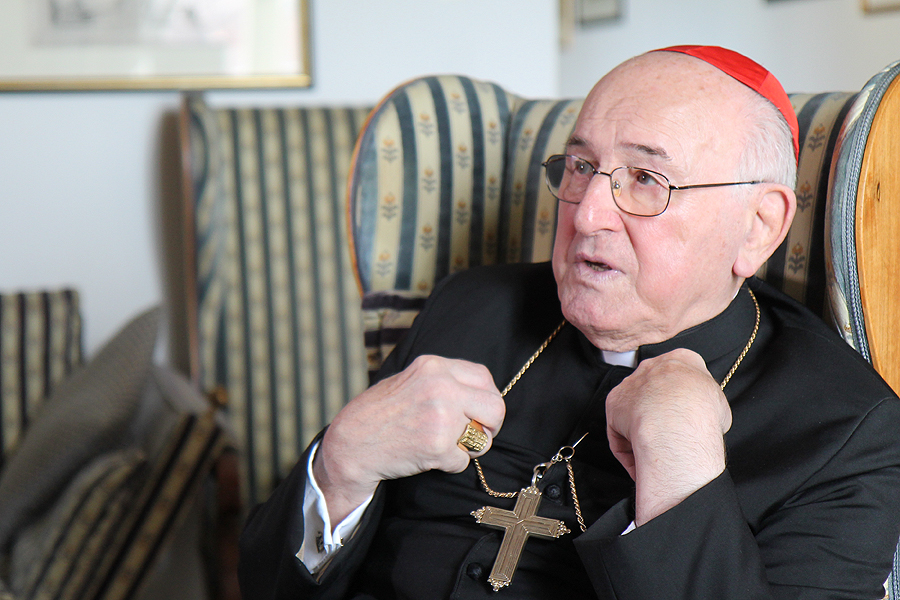Today, on 20 June, Reuters published a new interview with Pope Francis. Although the interview is making headlines because of the Pope’s criticism of President Donald Trump’s immigration policy, it also contains another controversial assertion: the pope surprisingly now claims that he only heard about the Dubia (concerning his document Amoris Laetitia) “from the newspapers” — a claim that Dubia cardinal Walter Brandmüller has now questioned in comments to OnePeterFive. From the text of the interview:
The pope also commented on internal criticism of his papacy by conservatives, led by American Cardinal Raymond Leo Burke.
In 2016, Burke and three other cardinals issued a rare public challenge to Francis over some of his teachings in a major document on the family, accusing him of sowing disorientation and confusion on important moral issues.
Francis said he had heard about the cardinals’ letter criticizing him “from the newspapers … a way of doing things that is, let’s say, not ecclesial, but we all make mistakes”.
He borrowed the analogy of a late Italian cardinal who likened the Church to a flowing river, with room for different views. “We have to be respectful and tolerant, and if someone is in the river, let’s move forward,” he said. [emphasis added]
He thus implies that the Dubia cardinals did not follow the correct ecclesial procedures and violated the law of courtesy toward the pope by making their text public without first sending it to him privately.
We also contacted Cardinal Walter Brandmüller, one of the four Dubia cardinals, asking him for comment. The cardinal responded in writing and said the following:
The Dubia were first published after – I think it was two months – after the Pope did not even confirm their reception. It is very clear that we wrote directly to the Pope and at the same time to the Congregation for the Faith. What should be left that is unclear here?
Vatican journalist Edward Pentin tweeted earlier today, also contesting the pope’s account, saying “he received the dubia two months before the cardinals went public and instructed ++Muller not to respond. Memory lapse perhaps.” Here Pentin was referring to Cardinal Gerhard Müller – then-Prefect of the Congregation for the Doctrine of the Faith (CDF). OnePeterFive has reached now out to Cardinal Müller’s own secretary, asking him for a confirmation of this new papal claim, but has not received a response as of this writing.
Let us recapitulate the events leading up to the publication of the Dubia in 2016:
First, on 19 September 2016, the four Dubia cardinals (together with two prelates who preferred to remain unknown and in the background) wrote a letter to Pope Francis which contained the five Dubia – questions of doubt – concerning his Post-Synodal Exhortation Amoris Laetitia. They waited for two months and did not receive any official response to their letter – neither from Pope Francis nor from the CDF, to whom they had also sent a copy.
Then, on 14 November 2016, the four Dubia cardinals – Carlo Caffarra, Raymond Burke, Walter Brandmüller, and Joachim Meisner – made their letter to Pope Francis public, hoping thereby to foster a discourse about the matter of Amoris Laetitia. As Pentin had then reported:
As the Pope decided not to respond to the dubia, the four signatories said they read “his sovereign decision as an invitation to continue the reflection and the discussion, calmly and with respect,” and therefore have decided to inform “the entire people of God about our initiative and offering all of the documentation.”
In December of 2016, Cardinal Müller said in an interview that the CDF speaks “with the authority of the pope” and that it therefore could not “participate in the controversial dispute.” As Deacon Nick Donnelly commented at EWTN in response to this story, “Though Cardinal Müller doesn’t come out and say it, his interview with Kathpress strongly implies that Pope Francis has told him that the Congregation for the Doctrine of the Faith must not reply to the four cardinals’ dubia on Amoris Laetitia.”
Pentin’s tweet today appears to confirm this interpretation of the cardinal’s statements.
The impetus is now on the Vatican to correct the pope’s statement. Failure to do so would damage the good name of the then-four Dubia cardinals – two of whom have since died – implicating them in a failure to follow correct ecclesial procedures. What has been clear since the Dubia were first issued was the caution with which the four approached the matter. Their uprightness, their moral character, their love for the Church and the Pope, all indicate that they would never have taken action outside the established ecclesial procedures for addressing such matters.
OnePeterFive reached out to the Vatican Press Office for comment, but we have received no response at this time.


